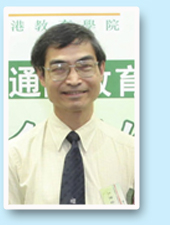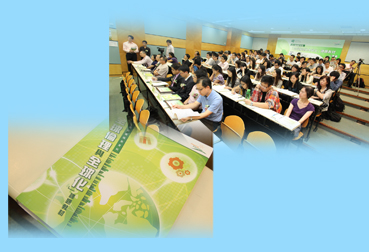 |
 |
| |
Selected Development Project |
| |
 |
| Project Title |
Global Ethics and Liberal Studies: Teaching Materials Development and Supporting Programme for Teaching and Learning, 2009-2010 |
|
| |
| Principal Investigator |
Dr. Wong Ping Ho |
|
| |
| Area of Research Project |
Curriculum Programme and Education |
|
|
|
|
|
| Project Period |
|
|
| Objectives |
|
Attempting to integrate the ¡§Global Ethics¡¨ and the ¡§Globalization¡¨ modules of the subject Liberal Studies of the New Senior Secondary (NSS) Curriculum, the Project aims
-
To develop a teaching kit for the “globalization” module with reference to Global Ethics;
-
To develop experiential learning activities that meet the requirements both of Liberal Studies and of Moral and Civic Education in the ¡§Other Learning Experiences¡¨ (OLE) domain of the NSS Curriculum in order to broaden the horizons and to develop the positive values and attitudes of students;
-
To develop the ability of students to tackle issues through multiple perspectives and critical thinking, and enable them to reflect on humanitarian values and concerns; and
-
To establish a collaborative school network in the teaching and learning of Liberal Studies in order to enhance the collaboration, mutual support, and resource sharing of teachers through the development of teaching and learning of the ¡§Globalization¡¨ module.
|
 |
|
| Methods Used |
-
Integration of Values Education into Liberal Studies through Development of a Teaching Kit
The framework for the development of the teaching kit was designed according to the Liberal Studies Curriculum and Assessment Guide (Secondary 4-6) published by the Education Bureau. The teaching kit was developed by CRSE and an editorial group consisting of frontline teachers. The teaching kit covers the following broad themes:
- Global Economic Affairs;
- International Conflicts and Global Crisis; and
- Ethnicity, Religion, and Culture.
-
Experiential Learning Activities
To integrate the learning of Liberal Studies with Moral and Civic Education under the Other Learning Experiences domain, the following four sets of experiential learning activities were organized for partner schools with the collaboration of non-governmental organizations:
- Global Financial Affairs;
- Fair Trade;
- Alternative Responses to Poverty in the Local Community; and
- International Cooperation and Environmental Conservation.
-
Professional Development and Promotion of Teachers
To further promote the integration of Global Ethics and the “Globalization” module of the Liberal Studies Curriculum among the teaching profession and the public, the following events for the professional development and promotion of teachers were held:
- School talks for partner schools; and
- 2 sharing sessions for teachers: ¡§How to enhance students¡¦ value development through experiential activities?¡¨ and ¡§Sharing of Teaching Experience and Teaching Plan Demonstration on Global Ethics and Globalization.¡¨
|
| Summary of Findings |
-
The idea of Global Ethics is integrated into the Liberal Studies Curriculum according to the 4Rs (Respect, Responsibility, Response, and Reciprocity) model, which informed the development of the teaching kit.
|
| Respect |
Based on the two fundamental principles of “Global Ethics,” the “Respect” dimension reminds teachers of the importance of helping students to know and understand “others,” and to respect the distinctiveness and differences of “others” from themselves. These principles are especially important in the contexts of economic and political globalization in order to help students question the situations to which the neglected, exploited, and disadvantaged are subjected. |
| Responsibility |
The “Responsibility” dimension addresses the construction of students of their own identity as members of this global village, whose decisions and actions would have effects on others, as well as the natural world. This dimension arouses the awareness of students of their own duties and responsibilities, and thus motivates them to practice the four “irrevocable directives” put forward by the “Global Ethics” movement. |
| Response |
The “Response” dimension helps students’ put the values and ideas of “Global Ethics” into practice in their everyday lives. |
| Reciprocity |
The “Reciprocity” dimension aims to develop in students the awareness of the interconnected and reciprocal nature of all lives on earth, and to foster mutuality as one of the guiding values informing their actions. |
|
-
The integration of values education and Liberal Studies has been achieved in the design of the teaching kit. Through a questionnaire survey, positive feedback and comments on the teaching kit were received from teachers of the 12 partner schools, indicating that the teaching kit generally fitted the needs of teaching and learning. The kit was especially highly appraised in the following areas: ¡§reduce teachers¡¦ workload¡¨; “can encourage students to reflect on globalization from ethical/value perspectives¡¨; “can facilitate teaching¡¨; “can enhance student¡¦s knowledge¡¨; and ¡§is recommended for adoption.¡¨
|
-
The experiential learning activities have helped students to reflect on the ethical dimension of globalization. According to the post-activity questionnaire survey conducted in the year 2010¡V2011, approximately 80% of students and teachers stated that the experiential learning activities enhanced their knowledge and understanding of the respective topics, and were especially helpful in developing their critical thinking and stimulating their reflections on these issues from an ethical perspective.
|
Impact |
-
12 schools joined the project as partner schools in the year 2010-2011, involving 30 Liberal Studies teachers and their students;
-
A total of 633 students and 40 teachers participated in the project¡¦s experiential learning activities in the year 2010-2011;
-
Talks were held for 11 partner schools during 2010-2011, attended by 2,150 students;
-
Two sharing sessions were held, which received positive feedback from teachers and the public. The second sharing session, which was part of the inauguration of the teaching kit, was heavily oversubscribed, although the venue could accommodate only 70 teachers from 45 schools;
-
Through the Project, CRSE has established a collaborative relationship with the Institute of Sino-Christian Studies (ISCS). The proposed next step is the promotion of education in Global Ethics and globalization in Mainland China through the sharing, further development, and theorization of experiences earned in Hong Kong schools;
-
Global Ethics is a worldwide movement. Through the Project, CRSE has contributed to raising awareness of issues of global concern that are part of the work of the movement. Dr. Stephen Schlensog, Secretary General of Global Ethic Foundation (GEF), visited the Hong Kong Institute of Education on 5th May 2010, and delivered a public lecture entitled ¡§Global Ethic and Global Economy.¡¨
|
Selected Publications Related to the Study |
|
|
| Biography of Principal Investigator |
Dr. Wong Ping Ho served as a secondary school teacher for ten years, teaching various subjects, before moving into teacher education by joining the Hong Kong Technical Teachers' College in 1988. He moved over to the Hong Kong Institute of Education in 1994, when it was established through the amalgamation of the Colleges of Education. Dr. Wong's interest in religious and spirituality education began when he attended the HKU M.Ed. program on Moral and Religious Education. He continued to pursue his study of spirituality education through a Ph.D. from the University of Hull. Children's spiritual development and spirituality education have remained his main areas of research. He was also involved in the establishement of the Institute's Centre for Religious and Spirituality Education in 2006, of which he is currently the Director.
Dr. Wong has served as Subject Coordinator of the Institute¡¦s Doctor of Education (Life and Values Education) and Master of Education (Life and Spirituality Education) programmes. For his outstanding contributions to Life Education, he received the Life Education Award (Individual Category) presented by the China Soong Ching Ling Foundation in 2011.
|
Funding Source |
| Quality Education Fund |
|
|
|
 |
|
 |


